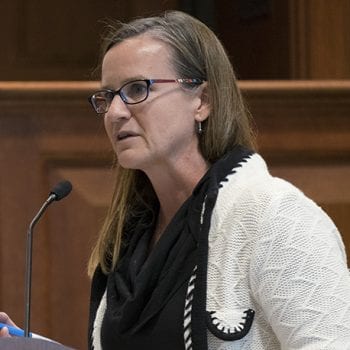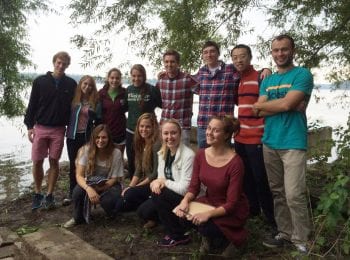Beth Martin is a Senior Lecturer in Environmental Studies and a Gephardt Institute Community Engagement Faculty Fellow. She teaches a range of courses, including a freshman seminar focusing on the environment of St. Louis and a senior level seminar that prepares students to attend annual international climate negotiations.
As a Community Engagement Fellow this semester, Beth has coordinated a stakeholder process that will define needs and priorities of a new faculty and academic engagement position at the Gephardt Institute. She has participated in site visits to comparison institutes to learn about the strategies, successes, and challenges of their academic engagement initiatives. Beth synthesized findings and best practices with the support of Annalise Wagner, a senior serving as Faculty Engagement Coordinator at the institute. Additionally, Beth oversees the Community-Engaged Teaching grants of the institute’s Civic Engagement Fund and serves as a point of contact for community-engaged faculty seeking assistance with new and preexisting community-engaged courses.
Below, Beth discusses her efforts to support Community-Engaged Teaching across campus.
How would you describe your work as a community-engaged instructor?
As an instructor, I try to help students understand how what they learn in the classroom has relevance and life outside of the classroom. Through my work at the Gephardt Institute, we are determining what questions need to be asked and what support faculty may need or want in terms of beginning or increasing the amount of community-engaged work that they do.
What courses do you teach right now?
I am teaching a freshman seminar called “A Sense of Place: Exploring the Environment of St. Louis.” I developed this seminar from the perspective of someone who is not a native St. Louisian. I thought about students coming from different places and experiencing unique aspects of St. Louis’s natural and built environment for the first time. I also explore the intersections between environment and people; how the environment influences our decisions, and our impact on it.
The course is designed in four modules: urban and built environment, rivers, prairies, and contamination and built environment. I incorporate field trips and activities into each module. On one trip, we take a tour of St. Louis neighborhoods and learn about the environmental and social aspects of their development. We also watch a film on Pruitt-Igoe, a public housing project that was built on the near north side of St. Louis in the 1950s and razed just 20 years later. We discuss how it relates to Mill Creek Valley, which was similarly cleared by the city. Later in the semester, students research a particular neighborhood and present on issues it faces from environmental, built, and human lenses.
The goal of the course is to help first-year students see themselves as members of the WashU community and feel comfortable entering the St. Louis community.
What would you tell fellow faculty members to encourage them to consider a community-engaged component in their teaching?
There’s often a learning phase that needs to come first. In conversation with many faculty and departments, often in the science and engineering fields, I’ve noticed that there’s often the claim that ‘we don’t do Community-Engaged Teaching.’ We have a conversation, and then we realize, ‘yes, you do!’ So we’re getting a sense of what the current picture looks like. We’ve also spent a lot of time bringing faculty together to share ideas and best practices and look forward to continuing that work next year.
There are certainly hurdles to adding a community-engaged teaching component to a class, but the benefits to students and community partners outweighs them. I encourage faculty to have a conversation with Gephardt Institute staff and discuss how we can work with you to manage and overcome obstacles. As an example, we are establishing a transportation fund so faculty can easily understand how to access and secure transportation for use in community-engaged courses. This is one of several incentives that we are implementing with the support of a faculty committee on Community-Engaged Teaching.
For you personally, how has it changed your teaching, and what makes you want to do this type of work?
You are going to get a different answer depending on the person. For me, it really is about the learning experience for students. They see, in a safe space, what some of the practical challenges will be when they leave WashU. That’s what I enjoy and how I like to teach. But that also connects with an awareness the students have of the impact they can have on the community. If we as an institution want this to be a learning experience for our students, it has to also be a beneficial experience for those in the community. If students can do something that helps someone, rather than produce something that sits on a bookshelf, why not?


